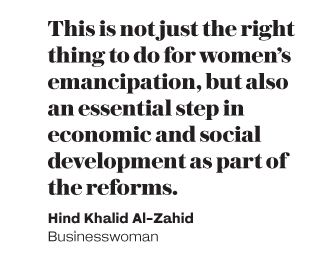The end of the driving ban will boost women’s financial power and allow them to play a bigger role in economic and social diversification in line with Vision 2030, prominent businesswomen said on Friday.
Hind Khalid Al-Zahid was the first Saudi woman designated as an executive director — for Dammam Airport Company — and also heads the Businesswomen Center at the Eastern Province Chamber of Commerce and Industry.
She sees the historic move as a huge step forward for businesswomen in the Kingdom.
“Women being allowed to drive is very important; of course this will help a lot in sustainable development as the lifting of the ban on women driving came as a wonderful opportunity to increase women’s participation in the workforce,” she told Arab News on Friday, ahead of the end of the ban on Sunday.
 She added that women in the job market are under-represented; they make up to 22 percent of the national workforce of about six million according to official estimates. Lifting the ban will help to take women’s representation in the workforce to 30 percent by 2030, she said.
She added that women in the job market are under-represented; they make up to 22 percent of the national workforce of about six million according to official estimates. Lifting the ban will help to take women’s representation in the workforce to 30 percent by 2030, she said.
“This is not just the right thing to do for women’s emancipation, but also an essential step in economic and social development as part of the reforms,” she said.
She said that there were different obstacles in increasing women’s participation in the workforce and other productive activities, and the driving ban was one of them. It was a strategic issue that needed to be addressed on a priority basis. With the issue resolved, it would help immensely in giving Saudi women better representation as they would help to diversify the Saudi economy and society.
She said that women could contribute hugely to the workforce and labor market as half of Saudi human resources were female, and unless allowed to excel in different sectors it would not be possible to do better, mainly because of restricted mobility.
A recent survey by the Jeddah Chamber of Commerce indicated that transportation was a major concern holding Saudi women back from joining the labor market.
Nouf Ibrahim, a businesswoman in Riyadh, said: “It will surely boost female economic participation and help increase women’s representation in the workforce immensely. It will also help to reduce the overall national unemployment rate as most of the unemployed are women and many of them are eligible as university graduates.”
She echoed the opinion that the move would help to bring an economic windfall for Saudi women, making it easier for them to work and do business, and thus play a bigger and better role that would help economic and social diversification in line with Saudi Vision 2030.
“Being able to drive from Sunday onwards after the ban is lifted will be a wonderful experience. Earlier we were dependent on a male family member and house driver to take us to workplace, to the shopping center, school or other required places for some work, now we can drive and that will allow active participation in productive work,” Sulafa Hakami, a Saudi woman working as the digital communication manager with an American MNC in Riyadh, told Arab News.
“Saudi women can now share effectively the bigger and better responsibilities,” she said.



























